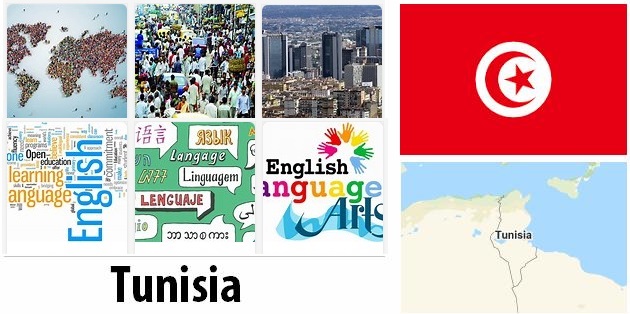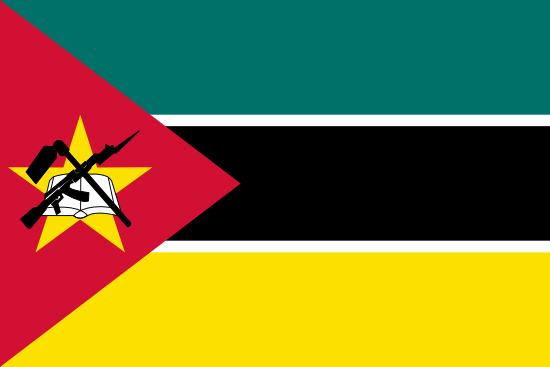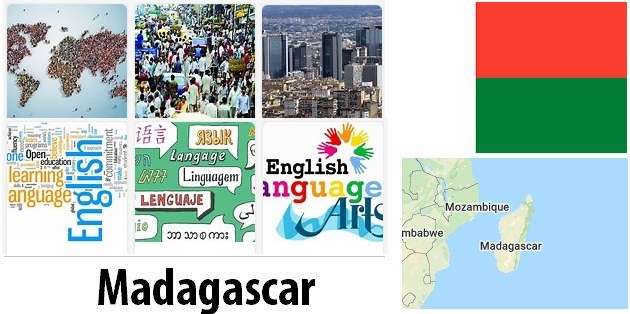Tunisia Population and Language
Tunisia has perhaps the most uniform population in North Africa. Most Tunisians count as Arabs. The original Berber population has been mixed up with Arabs who came to the country beginning in the 600s. In the oases in the south still live small groups of berber who have preserved their language and culture. During the 2010 century, the Berberians sought to gain greater attention for their cultural character and demanded that Berberians should be used in the education system.
The population is concentrated in the coastal areas of the north and east. The desert in the south is practically common except in the oases. Difficulties in sustaining themselves have driven the move into cities and emigration.
- COUNTRYAAH.COM: Key populations estimated size and data of Tunisia, including population density of how many people per square mile. Also included are facts for population and language.
Hundreds of thousands of Tunisians live abroad, many in European countries. Many have also worked in neighboring countries, especially in Libya, but in connection with the civil war there from 2011, almost 100,000 Tunisians have returned to their homeland. At independence in 1957, there were over 300,000 Europeans in the country but now only small groups remain.
Compared to neighboring countries, Tunisia has relatively low population growth, which is partly due to a successful investment in family planning and measures to strengthen the status of women.
Arabic is the mother tongue of almost all Tunisians, but many also speak French, which together with Arabic is used in education, administration and business. Some percent of the population in the south also speak Berber language.
UNHCR stated in 2020 that the largest refugee group in Tunisia was made up of people from Syria. Political turbulence in neighboring Libya has in recent years, partly as a result of fighting in 2019, that the Tunisians have also feared a growing influx of Libyans on the run. Occasionally, in addition, migrants from countries further south in Africa try to reach Europe via Tunisia.
FACTS – POPULATION AND LANGUAGE
Population
Arabs 98%, Berber 1%, other 1%
Number of residents
11 532 127 (2017)
Number of residents per square kilometer
74 (2017)
Percentage of residents in the cities
68.6 percent (2017)
Nativity / birth
18.3 per 1000 residents (2016)
Mortality / mortality
6.3 per 1000 residents (2016)
POPULATION GROWTH
1.1 percent (2017)
fertility rate
2.2 number of children born per woman (2016)
Percentage of women
50.6 percent (2017)
Life expectancy
76 years (2016)
Life expectancy for women
78 years (2016)
Life expectancy for men
74 years (2016)
Language
Arabic is the official language, in education, business and administration is also spoken French
2016
December
Victims of abuse testify
December 15
For two days, dozens of people testify about the abuse they suffered between 1955 and 2013. The testimonies broadcast on radio and TV form part of the Truth Commission’s work and deal with murders, rapes and torture carried out by the security service.
November
The Minister of Religion kicked after terror statement
November 4th
Abdeljalil Ben Salem may go since he publicly hinted that the conservative form of Islam practiced in Saudi Arabia has links to terrorism. The statement contradicts diplomatic principles, it says.
October
Mass convictions for soldier murder
October 12
Seventy-six people are convicted of murdering eight soldiers (see July 2013), but only seven of the accused, all Tunisians, are present in court. One of them is sentenced to death, five to between 7 and 13 years in prison and one is released. The other 69, most Algerians, are sentenced in their absence.
August
Government approved
August 27th
Youssef Chahed’s government can take office after Parliament approved it, with the votes being 168-22 and 5 abstentions. Chahed is 40 years old and thus the youngest head of government since France’s independence in 1956. Chahed emphasizes that the country faces severe economic challenges and that raising taxes and cuts in public jobs will be necessary if the situation does not improve rapidly.
Unity government is presented
20th of August
Youssef Chahed presents a government with 27 ministers and 14 secretaries of state. Eight women are given “important posts” and 14 ministers are described as “young”. Seven ministers remain from the outgoing government.
Government educators appointed
August 3rd
Pesident Essebsi assigns Youssef Chahed, Minister for Local Affairs, to try to form a unifying government.
July
Disbelief Vote against Essid
July 30
The Prime Minister loses a vote of no confidence in Parliament, with the vote numbers 118–3. His government has been accused of failing to deal with the economic crisis and high unemployment, as well as the threat of jihadists. The president now has ten days to try to find someone who can form a new government.
Machrouu Tounes holds congress
23 July
The party formed in March brings together over 3,000 participants at its first congress and elects Mohsen Marzouk as secretary general.
Essid wants a vote of no confidence
July 20
The prime minister is demanding the vote on his own government after several weeks of hard pressure to get him to resign. President Essebsi has spoken in a televised speech about the need to form a unifying government to meet the difficult economic, social and security challenges facing the country.
May
“Terrorist leader killed”
May 19th
One of the most dangerous terrorists in the country has been killed, according to the Ministry of Defense, which says the man Seifeddine Jameli was a member of the Tunisian IS group Jund al-Khilafa (Caliphate’s soldiers).
Ennahda separates religion from politics
May 19th
Party leader Rachid al-Ghannouchi says there is no longer room for “political Islam” in Tunisia, as of the 2014 constitution.
Many jihadists arrested
May 12
The government states that 37 suspected jihadists, including several with links to IS, have been arrested in connection with attacks in several locations in the country. The National Guard must have had several terror cells on its tracks for four months, which resulted in the intervention reportedly preventing new attacks. Four police officers are killed in one of the strikes, when a suspected jihadist unleashes an explosive charge that also takes his life. Another suspect is shot dead in a firefight.
Strike in Ben Guerdane
May 11
The city’s approximately 60,000 residents are protesting that the Libyan authorities in late April decided to stop trading across the border. Ben Guerdane is very poor and lives largely on border trade.
March
A new party is formed
March 20
Mohsen Marzouk who left Nida Tounes (see October 2015 and January 2016) forms Machrouu Tounes (or Mouvement du project de la Tunisie, roughly the Movement for the Tunisian project). The party claims to be an heir to the independence leader Bourguiba (see Modern history) and wants to keep religion and politics apart.
“A daily wage against terrorism”
the 12th of March
Prime Minister Essid urges public servants and people in general to donate the equivalent of a day’s salary to an anti-terror fund. President Essebsi has donated a monthly salary to the fund.
Many dead in averted attack
March 7
Security forces kill 50 suspected Islamists who have crossed the border from Libya and attacked an army base and a police station in the city of Ben Guerdane. Thirteen of the security forces and seven civilians are also killed in what President Essebsi calls an unprecedented attack. According to Prime Minister Essid, the perpetrators intended to take over the city and set up an “IS emirate”. The border is closed and curfew at night is introduced in the area.
Suspected Islamists killed
March 2
Five suspected Islamists who must have crossed the border from Libya are killed in a raid on a house near Ben Guerdane.
February
Border barrier against Libya
February 7
The government states that a 20-kilometer barrier along the border with Libya is completed. The barrier, which consists of sandbanks and the watercourse, should block out terrorists. It extends inland from the coast and corresponds to about half the border between the countries. A decision to build it was made after the terrorist act in Sousse (see June 2015). In the next phase, the border area will be equipped with electronic surveillance equipment, supported by Germany and the United States, the Ministry of Defense said.
January
Jumping splits Nida Tounes
January 26
The party loses the seat as the largest in parliament since 22 members jumped off and formed al-Horra (The Free Bloc). Nida Tounes now has 64 seats, against Ennahda’s 69. The dropout is a result of the battle that has raged within the party ahead of the upcoming leadership change (see October 2015).
Tourist travel is canceled
January 26
A British travel operator cancels all trips to Tunisia until November, due to the new wave of protests. British Foreign Affairs advises against travel that is not absolutely necessary.
Police officers demonstrate
January 25
Several hundred police officers participate in a protest operation outside the presidential palace, demanding higher salaries.
Curfew after social protests
January 21st
Rioting that has been going on for just over a week is described as the worst since the 2011 revolution. The protests against unemployment and poverty began in the city of Kasserine when an unemployed man died after climbing an electric pole, in what according to some data was a suicide. Now they have reached Tunis, where stores are set on fire and looting occurs. The government faces a curfew from 8pm to 5pm throughout the country, indefinitely. Prime Minister Essid is appealing to people to be “patient” and understand that it takes time to solve the problems. According to the World Bank, unemployment is at 15 percent; the number of university graduates is significantly higher.
Tourism hit hard
January 14
Revenue from the tourism industry fell by 35 percent in 2015 compared to the previous year, according to new data. The number of tourists decreased by 25 percent and the number of overnight stays by a full 44 percent.
The anniversary of the Revolution is being noticed
January 14
Thousands of people gather in Tunis on the fifth anniversary of President Ben Ali’s escape from the country (see January 2011). Many Tunisians are forced to acknowledge that they have not been better off financially since the revolution but think that democratization is worth noting.
New members of government
January 6
Essid carries out a major refurbishment in the year-old government. Foreign Minister Baccouche and Interior Minister Najim Gharsalli are among those allowed to go; they are replaced by Khemaies Jhinaoui and Hédi Majdoub. No explanation is given. Remaining in the government there is now only one member of Ennahda.




